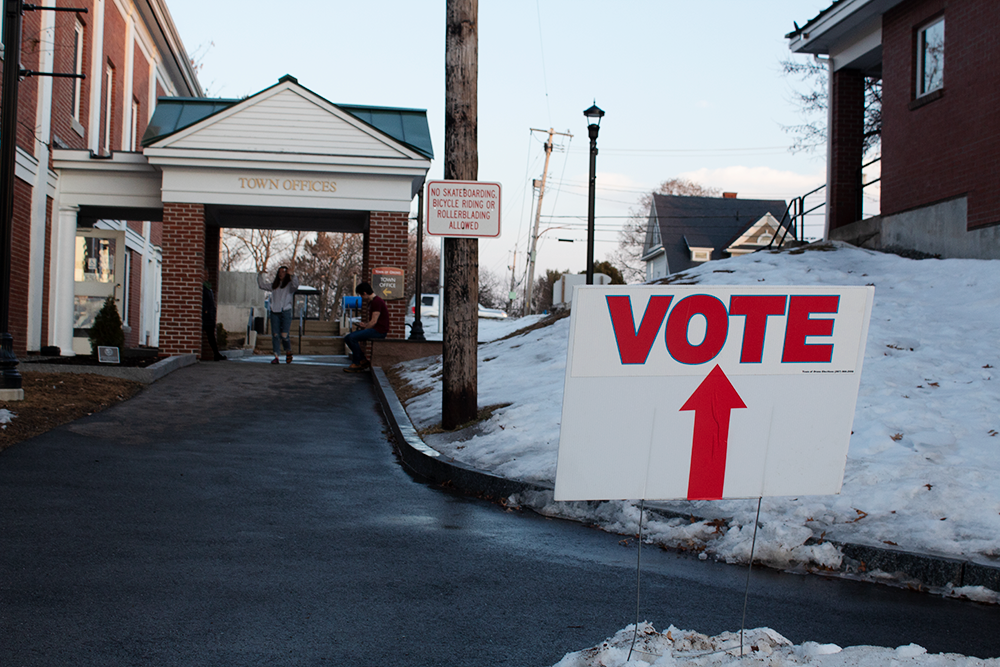This Tuesday, Nov. 7, 2023, will be the time for citizens of the State of Maine to perform their civic duty. From 7 a.m. to 8 p.m., the Collins Center for the Arts will be open for all Maine residents to cast their vote so their voices can be heard on important issues that affect everyone’s day-to-day life. Well, almost all Maine residents. People with mental illnesses and court-designated caretakers will not be able to vote, but by showing up to the polls, that can change.
Question 8 of the 2023 Referendum proposes removing the provision found in Article II, Section 1 of the Maine Constitution that bars people living with mental illness and under legal guardianship/conservatorship from voting. This provision was passed in 1837, and it has not been amended since.
Question 8 should be passed because the provision has been found unconstitutional and illegal.
In the 2001 Maine State case of Doe v. Roe, two women living with bipolar and one older woman suffering from multiple mental illnesses and a brain dysfunction brought the issue to trial. It was shown that while they were unable to make the best choices for themselves and they needed help in day-to-day life, they had the capacity and right to vote.
Before the case of Doe v. Roe, this question has been on Maine referendums twice (once in 1995 and once in 2000), where it has been defeated two times. However, with the recent drastic increase in mental health conditions, this measure is becoming more and more unsustainable. The World Health Organization reports a 13% increase in the occurrence of mental health conditions from 2007 to 2017 and a further 25% percent increase due to Covid-19-related stressors. With the seemingly never-ending increase in mental illness, this provision is becoming less and less feasible and fair.
Guardianship is a court-appointed helper who has control to help with all aspects of a person’s life (or some in the case of limited guardianship). This is found necessary when a person is unable to make or communicate responsible decisions for themselves. The Guardian is found necessary, and friends, family and mental health professionals have ruled out other options. Guardians can also be assigned to those who need to be assisted regularly with hygiene and day-to-day tasks, such as paying bills or going to work.
Just because a person needs assistance doesn’t mean they should be excluded from having their voice heard in elections or referendums. For example, we don’t exclude those who need assistance in other areas, such as physical disorders or disabilities. To exclude those who struggle with everyday tasks because of mental illnesses is likewise immoral and wrong.
To be assigned a guardianship, you must be found unable to make or communicate responsible decisions for yourself. However, this differs from making responsible decisions on a greater good level. Many people with mental conditions have been found capable of voting and regularly show up to the polls anyway, including the Doe in the Doe v. Roe case. Being unable to make decisions for your own care does not mean you cannot make informed and educated voting decisions.
Not being able to have their voices heard through voting may contribute to their continued symptoms and suffering. What if there was a referendum question regarding expenditure for mental health services, a huge change in the county or town they live in, or a question regarding an area of their life that a person with mental illness cared deeply about? The feeling of lack of control from not being able to have a say and the subsequent changes from issues they weren’t allowed to vote on may exacerbate their symptoms and contribute to higher mental illness rates overall.
Mental illnesses or disabilities can be induced or worsened through brain damage, either due to disease or actual injury. A recent study shows that approximately one in five individuals may experience mental health symptoms up to six months after mild traumatic brain injury. And that’s just mild. People with even traumatic brain disorders are allowed to vote, regardless of whether they are under guardianship or not. But if that brain damage induces new or worsening mental illnesses, you cannot vote. Does that seem right or fair?
The United States of America, and, by extension, the State of Maine, has had a long history of unfair voter exclusion. Historically, lots of demographics have been excluded from voting unfairly. We must continue the ongoing fight for human rights. Vote “yes” on 8 to help guarantee everyone’s voices can be heard and to protect the rights of those who are suffering already.






